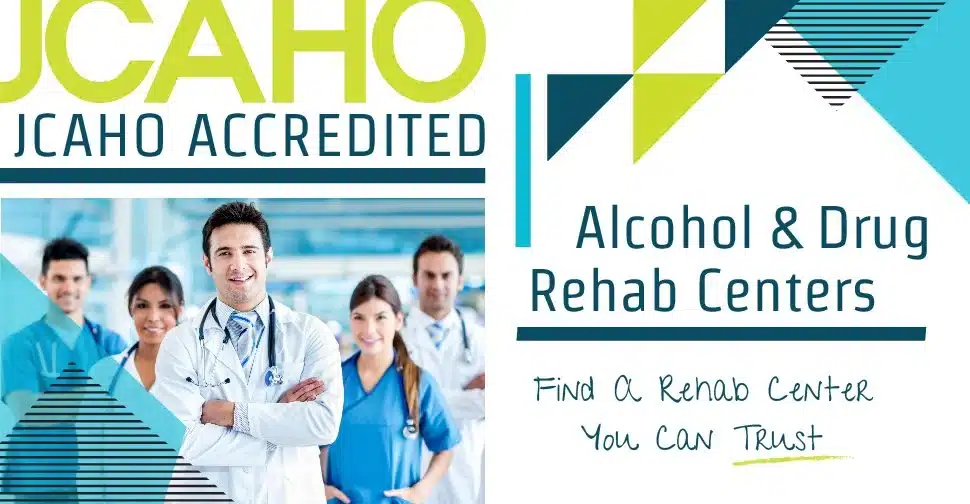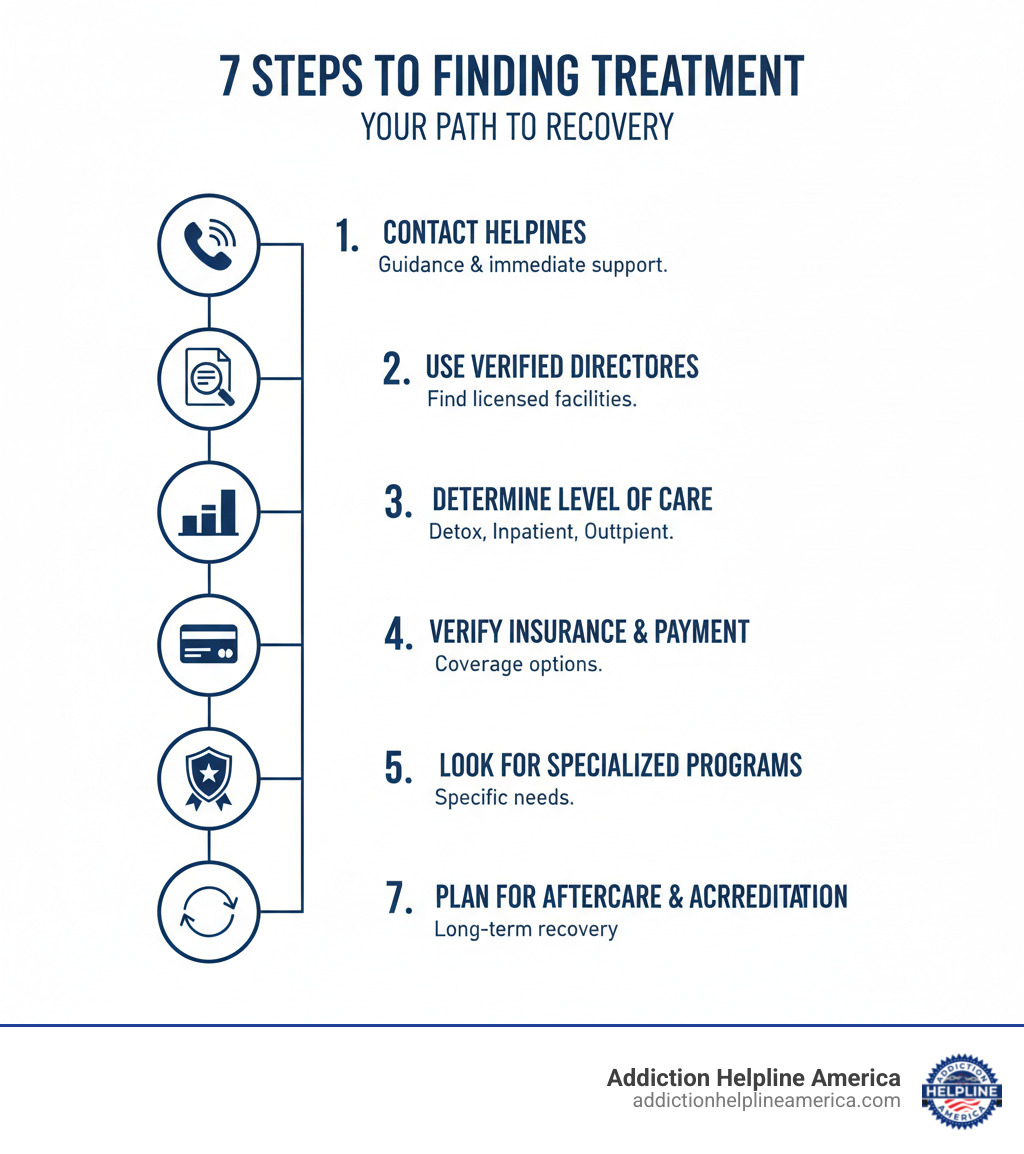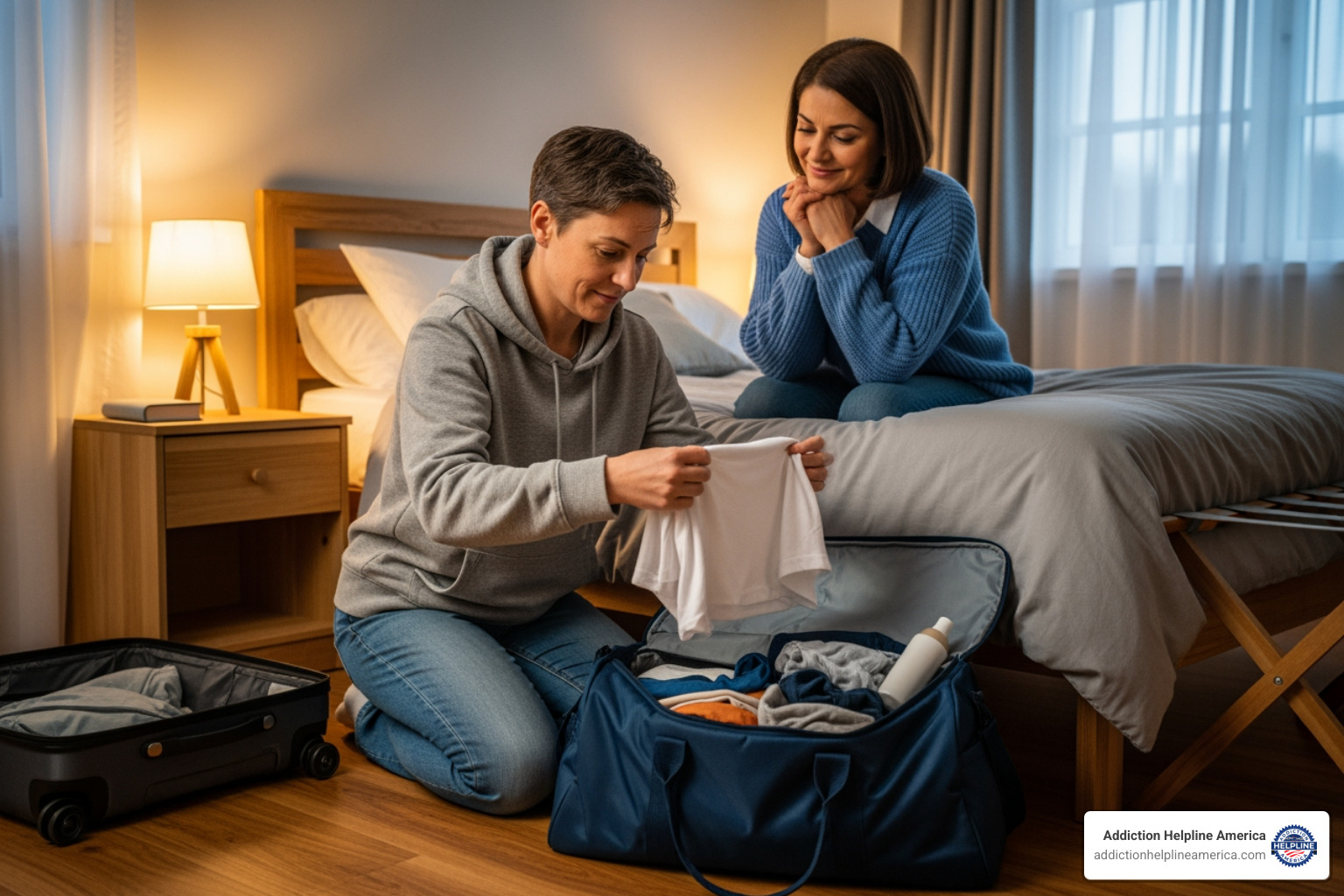
Why Finding the Right Treatment Facility Matters
To find a rehab center that meets your needs, follow these essential steps:
- Contact confidential helplines – Call SAMHSA’s National Helpline at 1-800-662-HELP (4357) or text 988 for immediate support.
- Use verified directories – Search FindTreatment.gov, a government-backed resource with thousands of licensed facilities.
- Determine your level of care – Choose from detox, inpatient, or outpatient programs based on your situation.
- Verify insurance coverage – Check if the facility accepts your insurance or offers payment assistance.
- Look for specialized programs – Find centers that treat your specific substance use disorder or co-occurring conditions.
- Confirm licensing and accreditation – Ensure facilities are state-licensed or nationally accredited by organizations like The Joint Commission or CARF.
- Plan for aftercare – Select programs that offer continuing support through alumni services or support groups.
Millions of Americans struggle with substance use disorders. In 2022, of the 54.6 million people who needed treatment, only about 13.1 million received it. The gap often comes down to one crucial factor: knowing where to start.
Finding the right treatment facility can feel overwhelming. The landscape includes thousands of options—from government-funded programs to private facilities, each with different approaches, costs, and levels of care. The challenge isn’t a lack of options; it’s understanding which one fits your unique situation.
Key factors like location, cost, and treatment philosophy all play a role. Some people recover best close to home, while others need distance from triggers. Many forms of payment are accepted, including private insurance, Medicaid, and sliding scale fees, making treatment more accessible than you might think.
At Addiction Helpline America, we help individuals and families find a rehab center that matches their specific needs, insurance, and recovery goals. This guide walks you through seven practical tips for finding effective treatment, from identifying quality facilities to preparing for admissions.
Recognizing the Signs: When to Seek Professional Help
Admitting that professional help is needed is often the hardest step in recovery. It’s natural to rationalize behaviors, but certain signs of a substance use or mental health crisis shouldn’t be ignored.
Key warning signs include:
- Behavioral Changes: Increased secrecy, impulsivity, aggression, or a loss of interest in hobbies and activities that were once enjoyed. Life may begin to revolve around obtaining and using a substance. Understanding how the usage of drugs can lead to increasing addiction is crucial.
- Physical Decline: Unexplained weight changes, a decline in personal hygiene, frequent illness, tremors, slurred speech, or changes in pupil size.
- Psychological Symptoms: Persistent sadness, overwhelming anxiety, dramatic mood swings, irritability, paranoia, or difficulty concentrating. For severe distress, our guide to emotional breakdown treatment offers guidance.
- Neglected Responsibilities: A pattern of missing work or school, failing to meet obligations, or letting bills go unpaid.
- Strained Relationships: Frequent arguments, social withdrawal, and a tendency to push away or blame loved ones who are trying to help.
- Tolerance and Withdrawal: Needing more of a substance to achieve the same effect (tolerance) and experiencing physical or psychological symptoms like nausea, shaking, or anxiety when use is stopped or reduced (withdrawal).
If these signs are familiar, it’s time to find a rehab center or mental health professional. Even one or two persistent signs warrant attention. Early intervention prevents problems from deepening and makes the recovery process more manageable. Making that first call is difficult, but we’re here to make the next steps as clear and supportive as possible.
Your Step-by-Step Guide to Find a Rehab Center
Taking the leap to get help is brave. But once you’ve made that decision, you might feel overwhelmed by the sheer number of options out there. Where do you even begin? How do you know which facility is right for you or your loved one?
The good news is that finding quality treatment doesn’t have to feel like searching for a needle in a haystack. With the right approach and reliable resources, you can steer this process with confidence. This section walks you through seven practical tips that will help you find a rehab center that truly fits your needs.
Tip 1: Start with Reliable and Confidential Information Sources
When you’re ready to find a rehab center, start with trusted, confidential resources to get accurate information without compromising your privacy.
At Addiction Helpline America, our confidential helpline connects you with treatment centers nationwide. Our team provides free, personalized guidance. You can reach out anytime through our Substance Abuse Hotline for immediate, judgment-free assistance.
Several government-backed resources also offer invaluable support:
- SAMHSA’s National Helpline at 1-800-662-HELP (4357) is a free, 24/7 treatment referral and information service.
- FindTreatment.gov is a confidential and anonymous directory of licensed facilities, authorized by the 21st Century Cures Act.
- The 988 Suicide & Crisis Lifeline provides free, confidential support 24/7. You can call or text 988 for immediate help.
- The Veterans Crisis Line offers specialized support for service members and veterans. Dial 988 and press 1.
Government (.gov) websites and official helplines are crucial because they are held to strict security protocols and exist for public service, not for profit. They provide unbiased information to help you find what you truly need.
Tip 2: Understand Treatment Types and Levels of Care
When you find a rehab center, it’s crucial to match the level of care to your needs.
- Medical Detox: The first step for physical dependence on substances like alcohol or opioids. It provides 24/7 medical supervision to manage withdrawal symptoms safely.
- Inpatient/Residential Treatment: The most intensive level, where you live at the facility. This provides a structured, trigger-free environment ideal for severe addiction or co-occurring conditions.
- Partial Hospitalization (PHP): “Day treatment” where you attend structured therapy for several hours, 5-7 days a week, and return home at night.
- Intensive Outpatient (IOP): A flexible option with treatment a few times per week, allowing you to maintain work or school responsibilities.
- Traditional Outpatient: The least intensive option, typically involving weekly therapy sessions. It’s suitable for milder conditions or as a step-down from higher levels of care.
Throughout these programs, you’ll work with a team of professionals. Therapists (LPCs, LCSWs, etc.) lead individual and group sessions using evidence-based methods like CBT and DBT to build coping skills. Psychiatrists are medical doctors who diagnose conditions, manage medications (including medication-assisted treatment), and oversee your medical care. This combination ensures holistic care for both mind and body. Our Addiction Treatment page offers more detail on therapeutic approaches.
Tip 3: Evaluate Key Factors to Find a Rehab Center That Works for You
Beyond the program type, several personal factors will influence your recovery when you find a rehab center.
- Location: Staying local allows for family involvement and building a local support network. Going out-of-state provides a fresh start away from triggers. We can help you Find rehab in your state or explore national options.
- Program Philosophy: Some centers follow 12-Step programs (like AA/NA), emphasizing peer support and spiritual principles. Non-12-Step programs focus on evidence-based therapies like CBT or secular methods. Many facilities offer a blend of both.
- Staff Credentials & Facility Accreditation: Quality centers employ licensed therapists, certified counselors, and credentialed medical staff. Look for accreditation from bodies like The Joint Commission (JCAHO) or the Commission on Accreditation of Rehabilitation Facilities (CARF), which signal high standards for care and safety.
- Amenities: While not essential, amenities like private rooms, fitness centers, or holistic therapies (yoga, equine therapy) can create a more comfortable healing environment. You can explore options through our Luxury Rehab Finder. The right environment is one where you feel safe and focused.
Tip 4: Look for Specialized Programs
Addiction and mental health challenges are not one-size-fits-all, and neither is treatment. When you find a rehab center, look for programs that address your specific situation.
- Co-occurring Disorders (Dual Diagnosis): About half of people with a substance use disorder also have a mental health condition. A dual diagnosis program treats both simultaneously, which is critical for lasting recovery.
- Opioid Addiction: Many centers offer medication-assisted treatment (MAT), combining therapy with medications like buprenorphine or methadone to reduce cravings and withdrawal. You can find providers through the Opioid Treatment Program Directory and the Buprenorphine Practitioner Locator.
- Veteran-Specific Programs: These programs address the unique challenges veterans face, such as PTSD, and offer peer support from those with shared military experiences. Our Veteran Addiction Treatment Complete Guide has more resources.
- Gender-Specific & LGBTQ+ Affirming Care: Single-gender or LGBTQ+ affirming programs can create a safer, more open environment for discussing sensitive topics with culturally competent staff. We can connect you with Mens Alcohol Rehab or women’s programs.
- Adolescent Programs: These offer age-appropriate therapies and educational support for teens and young adults. See our guide to Drug Rehab Centers for Minors.
Finding a program that understands all aspects of your situation is key to life-changing recovery.
Tip 5: How to Find a Rehab Center You Can Afford
The cost of treatment is a common worry, but financial barriers shouldn’t stop you from getting help. When you find a rehab center, understanding your payment options is key.
- Insurance: The Affordable Care Act requires most health plans to cover mental health and substance use treatment. In-network facilities are the most affordable, but out-of-network options may still be partially covered. Always verify your benefits with the insurance provider or the center.
- Government Programs: For veterans, the U.S. Department of Veterans Affairs (VA) offers comprehensive treatment. State-funded rehab programs provide free or low-cost services for eligible residents, often funded by Medicaid. Our page on Information on Free Rehab Centers has more details.
- Other Options: Many facilities offer sliding scale fees based on income. Non-profits like The Salvation Army and other organizations may provide grants or scholarships.
Don’t let perceived costs stop you. Many avenues exist to make treatment affordable. Our page on How Much Do Alcohol Treatment Centers Cost? can help you understand the financial landscape. We can help you find a center that fits your budget.
Tip 6: Prepare for the Admissions Process and Support a Loved One
Knowing what to expect during admissions can ease the anxiety of seeking treatment. The process generally includes:
- Initial Contact: A confidential call to a helpline like ours or the center to discuss your situation.
- Comprehensive Assessment: A detailed evaluation of your substance use, medical, and mental health history to determine the right level of care.
- Benefits Verification: The center will confirm your insurance coverage or discuss other payment options.
- Arrival: Upon admission, you’ll complete paperwork and receive a medical evaluation and orientation.
Our Rehab Admissions Hotline can walk you through these steps.
If you’re supporting a loved one, your role is crucial.
- Offer help, not enablement. Don’t make excuses or provide money for substances. Instead, help research treatment options.
- Educate yourself. Understand that addiction is a disease, not a moral failing. This fosters compassion over judgment.
- Consider an intervention. A professional interventionist can help facilitate a structured, productive conversation. Our Pre-Rehab Addiction Intervention Guide offers insight.
- Participate in family therapy. Many centers offer this to heal family dynamics and improve communication.
- Practice self-care. Support groups like Al-Anon or Nar-Anon can help you cope. Your support is powerful, but you can’t do the work for them.
Tip 7: Plan for Aftercare and Long-Term Support
Completing a rehab program is a major accomplishment, but it’s the beginning of a lifelong journey. A robust aftercare strategy is essential for long-term sobriety. When you find a rehab center, ask about their aftercare planning.
A good plan provides a continuum of care, gradually stepping you down from intensive treatment to more independent living. Key components of aftercare include:
- Sober Living Homes: These offer a structured, substance-free environment for those transitioning out of inpatient care, bridging the gap to full independence.
- Alumni Programs: Many centers offer programs to keep former residents connected through meetings, events, and mentorship.
- Peer Support Groups: These are cornerstones of long-term recovery. AA (Alcoholics Anonymous) and NA (Narcotics Anonymous) offer free, widely available 12-Step support. SMART Recovery provides a secular, science-based alternative.
- Family Support: Groups like Al-Anon and Nar-Anon provide crucial support for family and friends, helping the entire family system heal.
The goal of aftercare is to equip you with the tools and support systems needed to prevent relapse and build a fulfilling life. The power of Group Therapy New Orleans is an example of the community support that is vital for recovery, no matter where you live. A facility that prioritizes aftercare understands that recovery is a marathon, not a sprint.
Frequently Asked Questions about Finding a Rehab Center
As you find a rehab center, you’ll likely have questions. Here are answers to some common concerns.
How long does rehab usually last?
Treatment duration is custom to your individual needs. Common program lengths are 30, 60, and 90 days, with longer stays often recommended for severe or co-occurring conditions to allow for more profound behavioral change. However, addiction is a chronic disease requiring ongoing management. The initial stay is just one part of a continuum of care that includes aftercare and long-term support, which are crucial for lasting recovery. Your treatment team will help determine the right duration for you.
Can I lose my job for going to rehab?
No, you have legal protections. The Family and Medical Leave Act (FMLA) allows eligible employees to take up to 12 weeks of unpaid, job-protected leave for a serious health condition, which includes substance use disorder. Additionally, the Americans with Disabilities Act (ADA) protects individuals in recovery from discrimination and requires employers to provide reasonable accommodations, such as time off for treatment. Your employer only needs to know you are taking protected medical leave; the specific details are confidential.
What is the success rate of rehab?
There isn’t a simple percentage, as “success” is nuanced. Addiction is a chronic disease, and like other chronic conditions, it requires long-term management. Relapse does not mean treatment failed; it often indicates that the treatment plan needs adjustment. Research shows that completing treatment and engaging in aftercare significantly improves long-term outcomes. Success is measured by continuous effort, learning coping skills, and building a strong support network. This is why aftercare is so vital. When you find a rehab center, always ask about their long-term support and aftercare planning.
Conclusion: Your Path to Recovery Starts Here
The decision to find a rehab center is a courageous first step toward healing. While the process may seem daunting, this guide provides a clear roadmap to steer your options with confidence.
Personalization is key. Today’s treatment landscape is diverse, offering everything from inpatient care to flexible outpatient programs, 12-Step to non-12-Step philosophies, and specialized care for co-occurring disorders, veterans, and more. Financial barriers are also more surmountable than ever, with options like insurance, state-funded programs, and sliding scale fees making treatment accessible.
Lasting recovery is built on a foundation of aftercare, including support groups, sober living, and alumni programs. Recovery is not just possible—it’s happening for thousands of people who took this same step.
You don’t have to do this alone. Addiction Helpline America offers free, confidential guidance to connect you with a verified, licensed facility that matches your unique needs and circumstances. Your path to a healthier future starts with one conversation.
Let us help you Find a Rehab Center with our confidential help. You deserve support, recovery, and the chance to feel whole again.
Our helpline is 100%
free & confidential
If you or someone you care about is struggling with drug or alcohol addiction, we can help you explore your recovery options. Don’t face this challenge alone—seek support from us.
24/7 Free & Confidential Addiction Support Helpline
Resources
Will my insurance
cover addiction
treatment?
We're ready to help
Find the best
drug or alcohol treatment
center
Are you or a loved one struggling with addiction? Call today to speak to a treatment expert.















